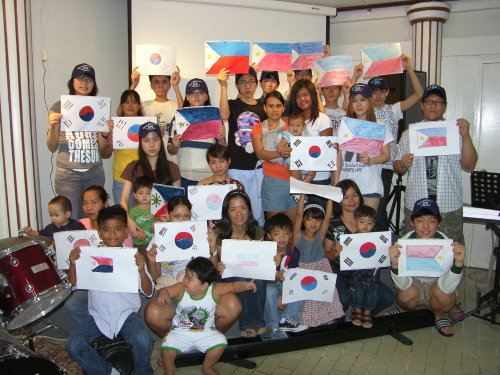Groups strive to support children abandoned by Korean fathers in Philippines
In Cebu, a Philippine resort island visited by tens of thousands of Koreans every year, an increasing number of Kopino children grow up in poverty and prejudice after being abandoned by their Korean fathers.
Many of them have never met their fathers, who left the Philippines as soon as they discovered the woman they had met at a bar was pregnant.
Now, groups of Korean emigrants are striving to share some of the responsibility, giving these children the care that their biological fathers refused to provide.
“Most of the Kopino children are born between Filipino women working at bars and clubs and Korean men who came to the Philippines for travel or to learn English,” Lee Jun-tak, director of the Kopino Children Foundation in Cebu, told The Korea Herald.
The foundation, established by a Korean businessman in 2009, now takes care of 23 Kopino families, paying frequent visits to their homes and providing with them basic living necessities.
There is no official data on the number of Kopinos, but the foundation estimates that there are at least 10,000 throughout the country.
Most of them live in financial difficulty, isolated from the rest of society. In some areas, they live together in Kopino villages.
“Recently, a 3-year-old Kopino child has been in need of special care after its mother was killed by her ex-boyfriend last month. The child doesn’t have a mother or a father now and is taken care of by her grandfather’s brother,” he said.
 |
Kopino children who were invited to Korea to experience Korean culture by Korea Youth Exchange Program Association from May 31 to June 5. (Korea Youth Exchange Program Association) |
As tourism flourishes
Most of the Kopinos’ fathers are tourists, short-term English students and businessmen.
More than 740,000 Koreans visited the Philippines last year, accounting for 21 percent of all foreign tourists in the country, according to the Philippine Tourism Department. Koreans are now the biggest group of foreigners to visit the country.
Kopinos are the byproduct of flourishing tourism industry in the Philippines as Koreans flock to this country for leisure, cheap English lessons and sometimes pleasure without considering the consequences.
Chang Ha-hyun, a Korean student studying in a university in Manila, told The Korea Herald a story typical of the Kopino experience.
“I heard a Korean man from a wealthy family in Korea came to study here and met a Filipino woman at a club and got her pregnant,” she said. “Then he just ran away, leaving behind a small amount of money and his surname Kim.”
Lee said: “Some men deny that the baby is theirs, some promise to their girlfriends that he will ask his parents in Korea permission to marry her, and go back to Korea, but never come back.”
Because of the strong Catholic influence, many of the Filipino women choose to keep the babies despite being abandoned, he explained.
Helping hands
There are some small groups and private organizations both in Korea and in the Philippines that help Kopino children and their families.
Among them, the Kopino Children Foundation and Korea Youth Exchange Promotion Association is among few that set up websites and promote their volunteering activities.
They help the Kopino children with what they have: The Kopino Children Foundation has one person paying visits to Kopino families with only about a 300,000 won ($277) donation per month and other small groups with a few resources but with affection and continuous care.
A small group in the city of Angeles holds regular meetings every other Saturday with five or six Kopino children, teaching them Korean and eating meals with them.
Korea Youth Exchange Promotion Association, a non-profit private organization in Korea has invited Kopino children and their mothers to Korea since 2009.
After watching a documentary on Kopino children four years ago, the association came up with a program to help them, according to Park Sang-chun, who is in charge of the Kopino invitation program at the association.
“We are the only organization that invites Kopino children to Korea,” Park said.
“I hope that the children feel that there are some people who are trying to help them although their Korean fathers abandoned them.”
“Many Kopino children have very pure hearts, hoping their fathers will come back to them sometime.”
Park said the Korean government is not making much effort to help these children, while it spends an increasing amount of money for multicultural families in Korea.
Lee at the Kopino Children Foundation stresses that the help should needs to continue.
“When documentaries on Kopino children are aired, people start to pay attention, but after some time passes, they forget,” said Lee at the Kopino Foundation. “What the children need is lasting attention and care.”
By Lee Woo-young (
wylee@heraldcorp.com)







![[Weekender] Korea's traditional sauce culture gains global recognition](http://res.heraldm.com/phpwas/restmb_idxmake.php?idx=644&simg=/content/image/2024/11/21/20241121050153_0.jpg)
